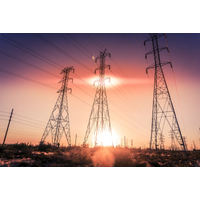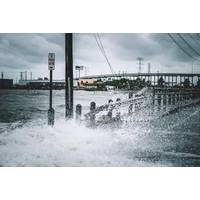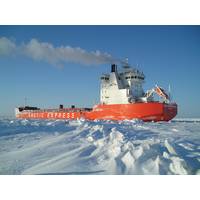Huafu fashion is among 37 Chinese companies that the US has banned imports of due to forced labor by Uyghurs.
The Department of Homeland Security announced on Tuesday that the United States had banned imports of 37 companies from China over allegations of human rights abuses against the Uyghurs. These companies are in the textile, mining, and solar industries. Huafu Fashion Co. is one of the largest textile companies in the world, along with 25 of its subsidiaries. The U.S. accuses them of forced labor practices in China's Cotton Industry.
US Energy Dept Forming Cyber Protection Unit for Power Grids

The U.S. Department of Energy (DOE) said on Wednesday it is establishing an office to protect the nation's power grid and other infrastructure against cyber attacks and natural disasters. President Donald Trump's budget proposal unveiled this week included $96 million in funding for the Office of Cybersecurity, Energy Security, and Emergency Response. Last July, the DOE helped U.S. firms defend against a hacking campaign that targeted power companies including at least one nuclear plant.
Jones Act Waiver for Puerto Rico Not Extended
The Jones Act waiver for Puerto Rico expired Sunday night and will not be extended, according to a Department of Homeland Security spokesperson. Homeland issued the waiver of the Jones Act on Sept. 28, after a request by Puerto Rico Governor Ricardo Rossello and pressure from lawmakers, including Senator John McCain and U.S. Representative Nydia Velázquez. Reporting by Stephanie Kelly
US Waives Jones Act to Secure Fuel for Hurricane Responders

The U.S. government on Friday said it was temporarily waiving a law that limits the availability of cargoes on the U.S. coasts, a step that will ensure enough fuel reaches emergency responders during Hurricane Irma and in the wake of Hurricane Harvey. The Jones Act mandates the use of U.S.-flagged vessels to transport merchandise between U.S. coasts. The Department of Homeland Security waived the requirement for one week. This will allow oil and gas operators to use often cheaper…
Russian hackers penetrated Vermont electric utility
A code associated with the Russian hacking operation dubbed Grizzly Steppe by the Obama administration has been detected within the system of a Vermont electric utility, The Washington Post reported on Friday, citing unnamed U.S. officials. The Russians did not actively use the code to disrupt operations of the utility, the officials told the Post, but penetration of the nation's electrical grid is significant because it represents a potentially serious vulnerability. Reuters could not independently confirm the story.
EIA to Sharpen US Weekly Oil Numbers with Real-time Export Data
The U.S. Energy Information Administration (EIA) has been granted access to real-time oil export information for the first time, allowing it to improve weekly estimates of fuel demand at a time of intensifying scrutiny of energy data. The change is likely to be welcomed by oil traders who routinely scrutinize the EIA's reports for clues on what is happening in the world's biggest oil consumer, who have long rued the agency's dependence on calculated figures.
CSX Train Hauling North Dakota Crude Derails
A CSX Corp train hauling North Dakota crude derailed in West Virginia on Monday, setting a number of cars ablaze, destroying a house and forcing the evacuation of two towns in the second significant oil-train incident in three days. One or two of the cars plunged into the Kanawha River, said Robert Jelacic of the West Virginia Department of Homeland Security and Emergency Management. CSX said the train was hauling 109 cars from North Dakota to the coastal town of Yorktown…
Republicans Set to Challenge Obama
Republicans take full control of the U.S. Congress this week with an agenda of trying to force approval of the Keystone XL oil pipeline and push back on President Barack Obama's sweeping policy shifts on Cuba and immigration. After years of battles over the budget and other issues, further clashes loom as Republicans who already control the House of Representatives take over the Senate majority on Tuesday after wins against Obama's Democrats in November's midterm elections.
US Govt's Nuclear Watchdog Victim of Cyber Attacks
The U.S. Nuclear Regulatory Commission was "successfully hacked" three times in recent years in attacks involving tainted emails, according to an internal investigation on cyber attacks at the agency, Nextgov.com reported on Tuesday. At least two of the attacks originated overseas, according to the report obtained by Nextgov, a rare public report with details of a cyber attack on the energy sector. The publication said it obtained a copy of a report by the NRC's Office of the Inspector General…
Maritime Fuel of the Future: Training to an Uncertain Standard
Despite its unquestionable allure, LNG as a fuel carries with it as many risks as it does answers to the problems it promises to solve. As industry and OEM’s work to remove any doubt, the collaborative effort outpaces the slow-moving regulatory machine. Even as Lloyds Register predicts that LNG will reach a maximum 11% share of marine propulsion solutions in 2030, it also says that segments with higher proportion of small ships will see the highest LNG uptake.
Arctic Energy Exploration Efforts Heat Up

Oil and gas—and also mining—are the drivers today propelling Arctic maritime operations and the construction of new vessels able to operate in extreme latitudes. While the gas and oil resources can be recovered in the Arctic or far north and shipped to markets by sea or pipeline, the cost of doing must be balanced upon the global market price for those commodities. Ships and marine structures able to operate in the harsh conditions of the extreme latitudes require special designs and construction techniques.
Energy Industry Needs Insurance Against Cyber Attacks
Energy companies have no insurance against major cyber attacks, reinsurance broker Willis said on Tuesday, likening the threat to a "time bomb" that could cost the industry billions of dollars. Willis highlighted the industry's vulnerability to cyber threats in its annual review of the energy sector's insurance market, which called on insurers to find a way to provide cover. "A major energy catastrophe - on the same scale as ...
Snipers Won't Blackout US Power Grid, but Sun May: Kemp
Owners and operators of high-voltage transmission lines and substations must identify critical facilities and implement a security plan to protect them from physical attack, the U.S. Federal Energy Regulatory Commission (FERC) ordered on Friday. The instruction comes in response to a recent investigation by the Wall Street Journal into a sniper attack on the Metcalf substation near San Jose in California in April 2013. ("Assault on California power station raises alarm on potential for terrorism" Feb.
Legislation Aimed at Reducing TWIC Red Tape
Bill Would Reform Enrollment Process in Flawed TWIC Program. U.S. Senator Kelly Ayotte (R-NH) introduced legislation today that would reform the burdensome enrollment process of the Department of Homeland Security’s Transportation Worker Identification Card (TWIC) program, which provides biometric identification cards to mariners and other transportation workers in order to allow them unescorted access to secure areas of ports, vessels, and other maritime facilities.
Ports Praise President’s Signing of Security Legislation
Public Port Authorities are commending President Bush for signing two key pieces of legislation that combined establish a framework for protecting the United States from maritime terrorism. The Homeland Security Act of 2002 and the Maritime Transportation Security Act were both signed into law at the White House yesterday. The new Department of Homeland Security will coordinate all border security functions, including those that will be responsible for maritime security, such as the U.S. Coast Guard, U.S.
Ports Applaud Signing of Security Legislation
for protecting the United States from maritime terrorism. Act were both signed into law at the White House yesterday. such as the U.S. Coast Guard, U.S. Security Administration and the Immigration and Naturalization Service. Transportation Security Act. the imperative task of securing our borders and our ports,” said Kurt J. Nagle, President of the American Association of Port Authorities (AAPA). essential in protecting the vital interests of the U.S. our overall national economy and security,” Nagle continued. “U.S.